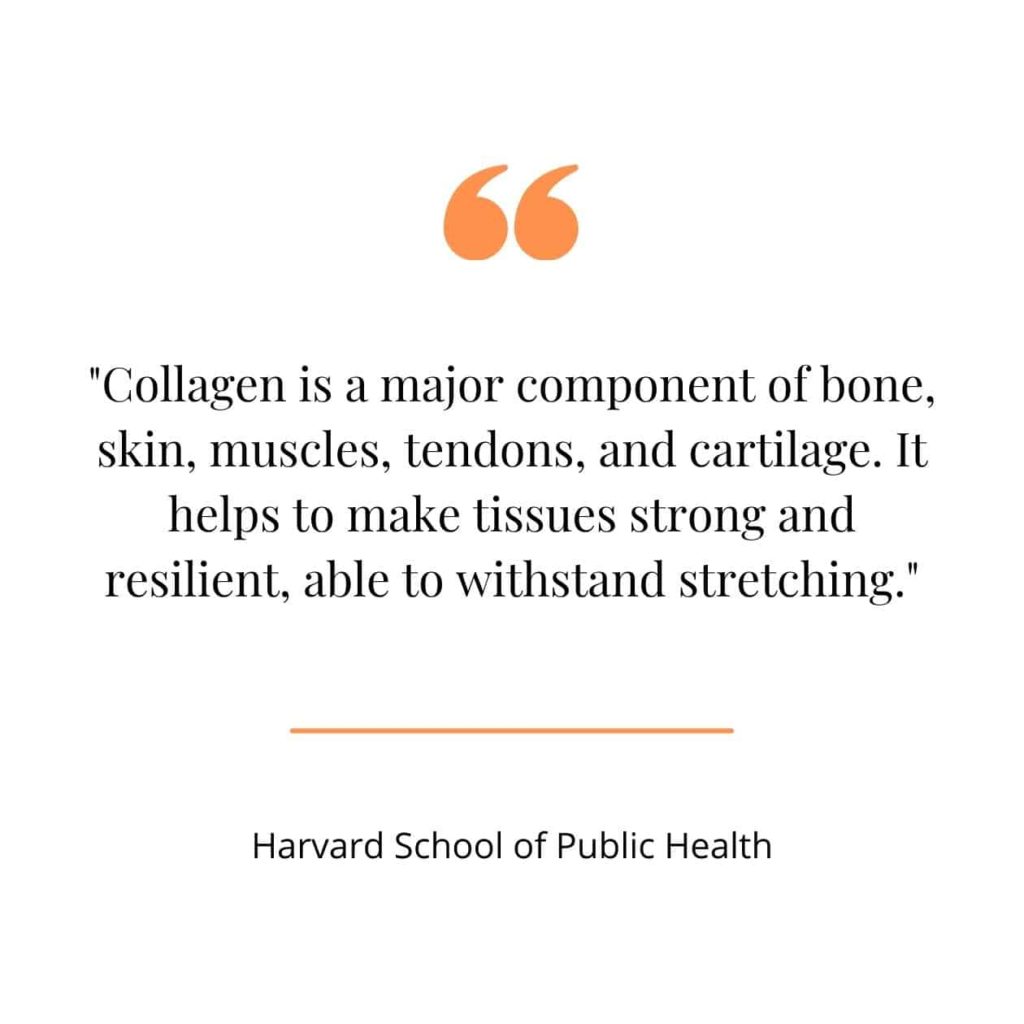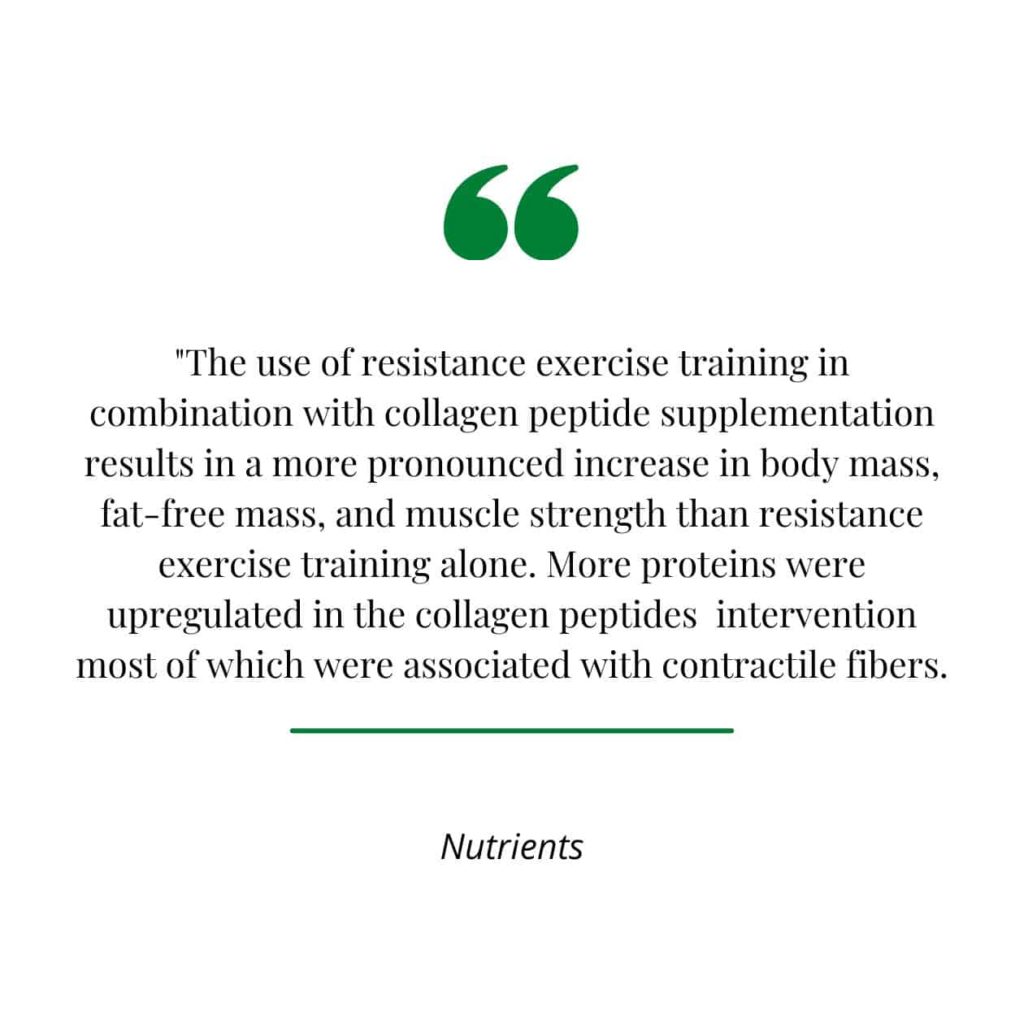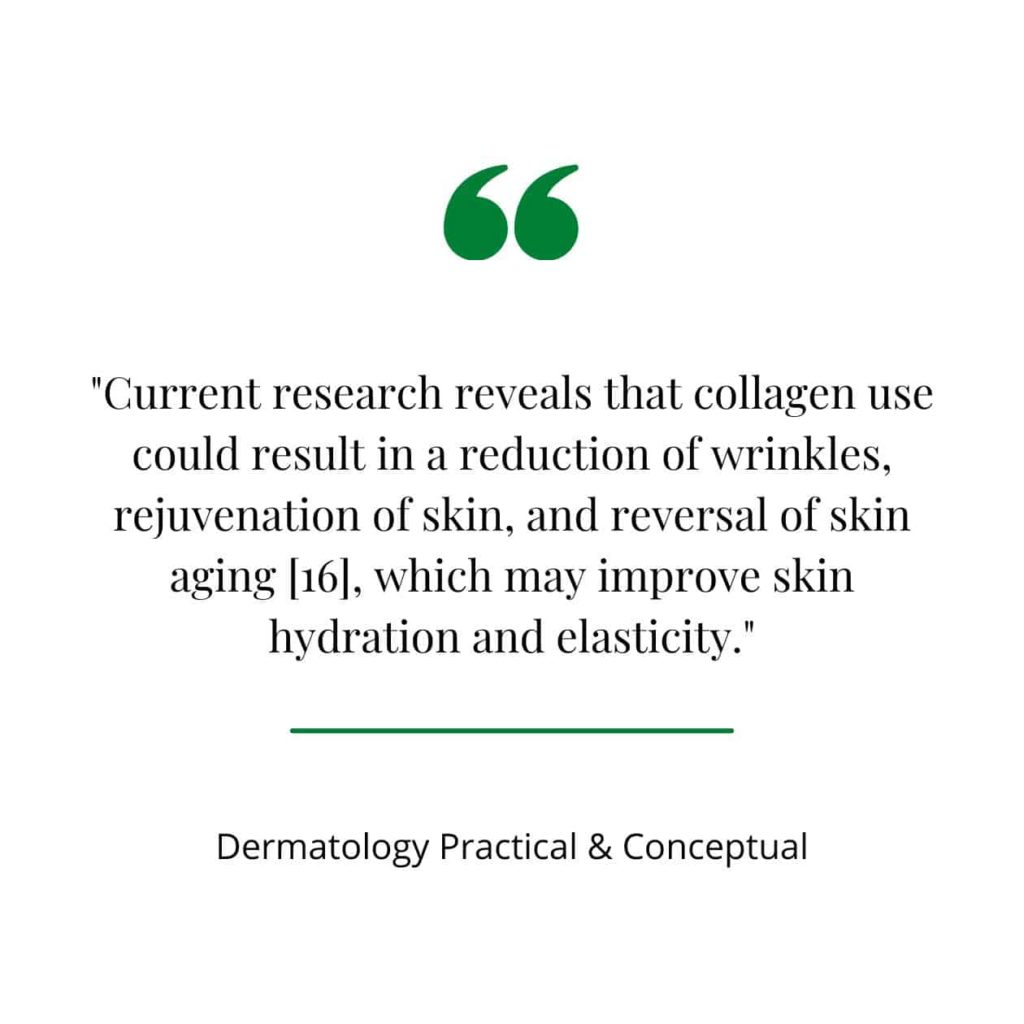Collagen for Skin: Benefits and Risks To Know About
“Collagen dipeptides that were taken over 56 days in a study by Inoue et al. also resulted in significantly more improvement in skin moisture, elasticity, wrinkles, and roughness for the subjects that received 10 mg per day in comparison to study participants who received 0.5 mg per day or placebo.”
Nutrients, A Collagen Supplement Improves Skin Hydration, Elasticity, Roughness, and Density: Results of a Randomized, Placebo-Controlled, Blind Study
Collagen is one of the main proteins that’s present in your body and it helps with many functions which includes building muscle, preventing bone loss, alleviating joint pain and dryness, and improving skin health by reducing wrinkles and dryness.
Collagen supplements are a popular option for those looking to boost their natural production and combat these signs of aging that show up as collagen production lessens over the years.
One of the main benefits of taking a collagen supplement is the effects it has on your skin. Whether you’re looking to reduce wrinkles, smooth out any bumps or blemishes, or just looking to maintain that healthy, youthful glow, collagen supplements may be for you!
So, what do you need to know about collagen and how it affects the skin? Here are 6 facts that will help you understand collagen and its benefits to keep you radiant and glowing!
What is collagen, exactly?

Collagen is the most prevalent protein in your body. It’s involved in a wide range of connective tissues, including tendons, ligaments, skin, and muscles.
Collagen also provides structure and strengthens your bones, among other things.
There are 28 distinct types of collagen, with the four most common ones being as follows:
- Type I collagen is the most common type of collagen, accounting for around 90% of collagen in the human body. It can be found in tissues such as skin, tendon, and bone. Type I collagen is strong and elastic, and plays an important role in wound healing.
- Type II collagen is the second most common type of collagen, and can be found in cartilage. It’s less strong and elastic than type I collagen, but is still an important component of the body.
- Type III collagen is found in tissues such as skin, muscle, and blood vessels. It is not as strong or elastic as type I collagen, but is still an important component of the body.
- Type IV collagen is found in the basement membrane, which is a layer of tissue that separates different types of tissue from each other. Type IV collagen is important for keeping tissues separate and helping to maintain the structure of the body.
Collagen supplements have grown increasingly popular in recent years. The majority of them are hydrolyzed, which means the collagen has been broken down to make it more absorbable.
Collagen-based supplements are available in a variety of forms, including powder and capsules. Collagen found in supplements comes in a variety of types, with some containing just one or two kinds and others containing up to five.
Collagen-rich foods

Collagen is a protein that is found in the connective tissues of the body. It helps to provide strength and support to these tissues. Collagen-rich foods can help to promote healthy skin, nails, and hair.
Some good sources of collagen include beef, pork, chicken, fish, eggs, dairy products, and certain fruits and vegetables. Supplementing with collagen can also help to improve the health of these tissues.
Animals have collagen in their connective tissue as well, and so many people believe that consuming animal products is the best way to get collagen into your diet.
However, there are some vegetarian and vegan sources of collagen as well. These include certain types of algae, some sprouts, and some beans.
Certain cooking methods can also help to increase the amount of collagen in food. For example, stewing or slow cooking can help to break down the collagen in meat and make it more bioavailable. Pressure cooking can also help to increase the collagen content of food.
Vitamin C is also important for collagen production. Foods that are high in vitamin C can help to promote collagen synthesis. These include citrus fruits, tomatoes, bell peppers, broccoli, and brussel sprouts.
Digestive enzymes break down the collagen in meals into individual amino acids and peptides. Collagen from supplements, on the other hand, has already been broken down or hydrolyzed, which is why it’s assumed to be absorbed more readily than collagen from meals.
Collagen supplements have many health benefits
Collagen supplements have a wide range of health advantages. Let’s take a look at just a few of those benefits:
1. Improve the health of your skin.
Collagen has several beneficial effects on the skin. It helps to keep skin firm, flexible, and hydrated. Collagen is essential for healthy-looking skin as you age since your body produces less of it with time.
However, several researchers have suggested that collagen peptides or supplements containing collagen may help reduce skin aging by reducing wrinkles and dryness.
According to one analysis of numerous research papers that focused primarily on women, taking 3–10 grams of collagen per day for an average of 69 days improved skin elasticity and moisture.
Collagen synthesis may be stimulated through the use of these supplements.
Collagen supplements may also aid in the development of other proteins that contribute to skin structure, such as elastin and fibrillin.
Collagen supplements have a long history of being used as anti-aging therapies. There are also many anecdotal claims that collagen supplements help with acne and other skin disorders, but these have not been proved by science.
2. Joint pain may be relieved.

A diet high in collagen helps to keep your cartilage, which is similar in structure to rubber, from crumbling.
As the amount of collagen in your body decreases with age, you are at a greater risk of developing degenerative joint diseases like osteoarthritis.
Collagen supplements have been shown to help reduce joint pain in some patients with osteoarthritis.
Supplemental collagen has been shown to accumulate in cartilage and stimulate your tissues to produce collagen, according to researchers.
As a result, this can help decrease inflammation, improve joint support, and reduce pain.If you want to take collagen supplements for the sake of pain relief, most studies suggest that 10 grams per day will provide a beneficial result.
3. Reduce the risk of bone loss by slowing down the aging process.
Bones are mostly composed of collagen, which gives them structure and strength. Bone mass degrades at the same rate as collagen in your body with age. This might lead to osteoporosis, which is characterized by low bone density and an increased risk of fracture.
According to reports, collagen supplements may aid in the prevention of bone deterioration that can lead to osteoporosis. In a 12-month research, women received either a calcium supplement containing 5 grams of collagen or one that didn’t.
Those who took the calcium and collagen supplement had significantly lower blood levels of proteins that promote bone breakdown at the study’s conclusion than those who only took the calcium.
4. It has been shown to improve muscle mass.

Collagen is a significant component of skeletal muscle since it is the most common protein in the body.
According to studies, collagen supplements help increase muscle bulk in people with sarcopenia, the deterioration of muscle mass that comes with aging.
In a 12-week study published in The British Journal of Nutrition, 27 male patients with this condition were given 15 grams of collagen while following a daily exercise program.
The patients gained significantly more muscle and strength than men who exercised but didn’t take collagen, according to the researchers.
The said study suggests that the supplemental collagen may stimulate muscle growth after exercise and promote the synthesis of muscle proteins such as creatine.
However, collagen protein isn’t any more effective than whey protein at increasing muscle or strength. That’s because, unlike whey protein, collagen is low in necessary amino acids — especially leucine — which are essential for muscle growth.
5. It may be beneficial to one’s heart health.
Collagen supplements have been linked to a reduced risk of heart disease, according to a study published in the British Journal of Nutrition.
Collagen gives structure to your arteries, the blood vessels that transport blood from your heart to the rest of your body. Arteries may become less flexible and elastic if there isn’t enough collagen.
High cholesterol levels can boost your chances of developing heart disease and stroke. This, in turn, can cause atherosclerosis, a condition in which the walls of your arteries become narrowed. Heart attack and stroke are two possible outcomes.
6. Other health advantages

Collagen supplements may have additional health advantages that have not been investigated extensively. These include:
- Hair and nails: Collagen might help your nails become stronger by preventing brittleness. It may also aid in the growth of your hair and nails.
- Gut health: Some health practitioners claim that collagen supplements can cure digestive permeability, also known as leaky gut syndrome. However, no scientific evidence supports this notion.
- Brain health: Collagen supplements have not been studied for their role in brain health, but some people claim that they help with mood and anxiety symptoms.
- Weight loss: Collagen supplements are thought to help people lose weight and increase their metabolism, according to many researchers. However, there is no evidence to support these claims.
Despite the promising possibilities, further study is required before definitive judgments may be made. That being said, many people swear by adding collagen supplements into their daily lifestyle.
Potential Negative Effects of Collagen Supplements
Collagen supplements are generally well tolerated and cause few, if any, adverse effects. However, some substances are manufactured from typical food allergens such as fish, shellfish, and eggs. Collagen supplements prepared with these components should be avoided by individuals who are allergic to them.
Some people who began taking collagen supplements have experienced nausea and bloating, but these reactions weren’t caused by the nutrients.
Collagen supplements can also cause gastrointestinal side effects such as heartburn and feelings of fullness. These supplements, however, appear to be healthy for the majority of users.
But what kind of results can you expect to see?

Collagen turnover is a sluggish process. As a result, you won’t notice any changes in your skin until at least 8 to 24 weeks after beginning collagen therapy.
And keep in mind, everyone reacts differently to medications and supplements, so keep an open mind and be patient. If you’re not experiencing the results you expected, try slowly upping the dosage as long as it’s safe to do so. You always want to consult your physician in these cases.
There are a number of excellent alternatives to collagen.
The collagen protein composition differs from other proteins, thus the choices are restricted. There are no vegan collagen supplements on the market right now considering collagen comes from animals, so if you have any vegan restrictions to your diet, collagen peptides may not be the right choice for you.
However, there are collagen-boosting supplements available that include the three fundamental amino acids needed in collagen synthesis: glycine, lycine, and proline. Vegan supplies are used to make some of these amino acids.
Hemp seeds are high in GLA, which has anti-inflammatory and antioxidant effects. They also include vitamin C and hyaluronic acid, which keeps your tissues hydrated and lubricated.
Keratin, a structural protein in hair, nails, and skin, has been proposed as an alternative to collagen but there is no data to support keratin products for anything except topical application on the skin and hair. It’s important to note that Keratin is not vegan because it’s produced from the feathers, wool, and horns of numerous animals.
In Conclusion
Collagen supplements are believed to promote several health advantages, as well as few known hazards. The nutrients in supplements may help you build muscle, prevent bone loss, alleviate joint pain and dryness, and improve skin health by reducing wrinkles and dryness.
Collagen is present in several foods, although it’s unclear whether they provide the same health advantages as supplements.
Collagen pills are generally safe, easy to acquire, and worth a try if you’re looking for ways to maintain or improve the health of your skin, joints, and more!
Organixx Clean Sourced Collagens blend contains five types of collagen from four sources. What’s more, it’s combined with targeted nutrients such as zinc, vitamin C, and vitamin B6 which specifically enhance the bioavailability and potency of collagen. Clean Sourced Collagens is formulated from the ground up to enhance and support your body’s natural ability to heal and rebuild itself from the INSIDE out.







Comments